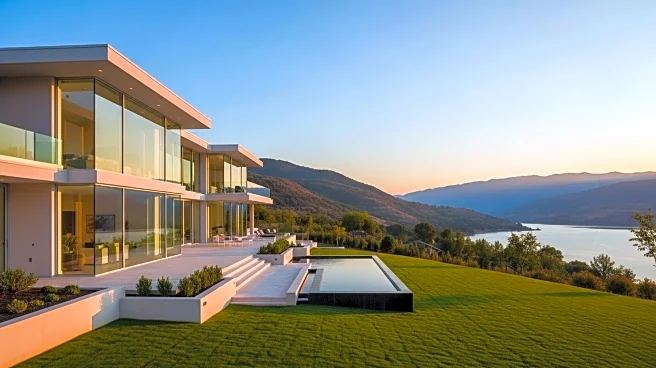What is the story about?
What's Happening?
In August 2025, the luxury real estate market witnessed significant sales, with the most expensive home sold being a Beverly Hills mansion for $47.5 million. This property, previously owned by billionaire Rick Caruso, was sold after a $15 million price reduction from its original asking price of $56.9 million. The sale highlights a trend of price reductions in the luxury market, as 20.8% of homes sold in August experienced price cuts, according to Redfin. Another notable sale was a newly-built home in Greenwich, Connecticut, which sold for $43.5 million, also after a price reduction. These sales reflect the broader market conditions where even high-end properties are not immune to the economic pressures affecting the real estate sector.
Why It's Important?
The trend of price reductions in the luxury real estate market indicates a shift in buyer behavior and market dynamics. Despite the high demand and low inventory that characterized the pandemic era, current economic conditions are prompting sellers to adjust prices to close deals. This could signal a cooling in the luxury market, potentially affecting real estate developers, investors, and high-net-worth individuals. The price adjustments also suggest that even affluent buyers are becoming more price-sensitive, which could influence future market strategies and valuations in the luxury segment.
What's Next?
As the luxury real estate market continues to adjust, stakeholders may need to reassess their strategies. Sellers might consider more competitive pricing or enhanced property features to attract buyers. Real estate agents and developers could focus on market trends and buyer preferences to better position their offerings. Additionally, economic factors such as interest rates and inflation will likely play a role in shaping the market's trajectory, influencing both domestic and international buyers' decisions.
Beyond the Headlines
The price reductions in the luxury market may also reflect broader economic uncertainties and shifts in wealth distribution. As economic conditions fluctuate, the luxury real estate market could see changes in buyer demographics, with more international buyers or younger affluent individuals entering the market. This could lead to a diversification of property types and locations that are in demand, potentially impacting urban development and real estate investment strategies.















